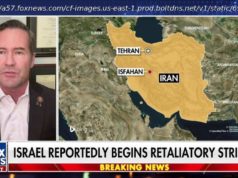The United Nations is holding an emergency meeting as the world expressed horror at the chemical weapons attack in northern Syria that killed dozens of people and left others gasping fo
The United Nations is holding an emergency meeting as the world expressed horror at the chemical weapons attack in northern Syria that killed dozens of people and left others gasping for breath and convulsing in the streets and overcrowded hospitals.
The Trump administration blamed the Syrian government for the attack, one of the deadliest in years, and said its patrons, Russia and Iran, bore „great moral responsibility“ for the deaths.
The British-based Syrian Observatory for Human Rights said at least 58 people, including 11 children, died in the early morning attack on Tuesday in the town of Khan Sheikhoun, which witnesses said was carried out by Sukhoi jets operated by the Russian and Syrian governments.
Videos from the scene showed volunteer medics using fire hoses to wash the chemicals from victims‘ bodies.
Haunting images of lifeless children piled in heaps reflected the magnitude of the attack, reminiscent of a 2013 chemical assault that left hundreds dead and was the worst in the country’s ruinous six-year civil war.
Tuesday’s attack drew swift condemnation from world leaders, including US president Donald Trump, who called it as a „heinous“ act that „cannot be ignored by the civilised world“.
The UN Security Council scheduled an emergency meeting for Wednesday in response to the strike, which came on the eve of a major international donors‘ conference in Brussels on the future of Syria and the region.
Mr Trump also blamed former US president Barack Obama for „weakness“ in failing to respond aggressively after the 2013 attack.
„President Obama said in 2012 that he would establish a ‚red line‘ against the use of chemical weapons and then did nothing. The United States stands with our allies across the globe to condemn this intolerable attack,“ he said.
Mr Trump left it to his top diplomat, secretary of state Rex Tillerson, to assign at least some blame to Russia and Iran, Assad’s most powerful allies.
Mr Tillerson called on both countries to use their influence over Assad to prevent future chemical weapons attacks and noted Russia’s and Iran’s roles in helping broker a ceasefire through diplomatic talks in the Kazakh capital Astana.
„As the self-proclaimed guarantors to the ceasefire negotiated in Astana, Russia and Iran also bear great moral responsibility for these deaths,“ he said.
In a statement, the Syrian government „categorically rejected“ claims that it was responsible, saying it did not possess chemical weapons, had not used them in the past and would not in the future.
It laid the blame squarely on the rebels, accusing them of fabricating the attack and trying to frame the Syrian government.
The Russian Defence Ministry said Khan Sheikhoun residents were exposed to toxic agents from a rebel arsenal hit by a Syrian air strike.
It was the third claim of a chemical attack in just over a week in Syria. The previous two were reported in Hama province, in an area not far from Khan Sheikhoun.
Opposition activists and a doctor in Idlib said it was the worst incident since the 2013 gas attack on the Damascus suburb of Ghouta that killed hundreds of civilians and which a UN investigation said used sarin gas.
Faced with international outrage over that attack, Assad agreed to a Russia-sponsored deal to destroy his chemical arsenal.
His government declared a 1,300-ton stockpile of chemical weapons and so-called precursor chemicals that can be used to make weapons, all of which were destroyed.
But member states of the Organisation for the Prohibition of Chemical Weapons have repeatedly questioned whether Assad declared everything.
The widely available chemical chlorine was not covered in the 2013 declaration and activists say they have documented dozens of cases of chlorine gas attacks since then.
The Syrian government has consistently denied using chemical weapons and chlorine gas, accusing the rebels of deploying it in the war instead.
Dr AbdulHai Tennari, a pulmonologist who treated dozens of victims of Tuesday’s attack, said it appeared to be more serious than a chlorine attack.
He said doctors were struggling amid extreme shortages, including of the antidote used to save patients, Pralidoxem.
Dr Mohammed Tennari, a radiologist and AbdulHaj Tennari’s brother, said Tuesday’s attack was more severe than previous ones in the province, most of which used chlorine cylinders.
„Honestly, we have not seen this before. The previous times the wounds were less severe,“ he said.
The doctor, who gave evidence before the United Nations in 2015 about renewed Syrian government use of chemical attacks despite claims it has destroyed its stockpiles, said there was a chlorine smell after Tuesday’s attack, but it was mixed with another unknown „toxic gas which causes poison and death“.
Mohammed Hassoun, a media activist in the nearby town of Sarmin, where some of the critical cases were transferred, said doctors there also believed it was probably more than one gas.
„Chlorine gas doesn’t cause such convulsions,“ he said, adding that doctors suspected sarin was used.
The province of Idlib, which is almost entirely controlled by the opposition, is home to some 900,000 displaced Syrians, according to the United Nations.
Rebels and opposition officials have expressed concerns that the government is planning to mount a concentrated attack on the crowded province.
New York-based Human Rights Watch has accused the Syrian government of conducting at least eight chlorine gas attacks on opposition-controlled residential areas during the final months of the battle for Aleppo last year that killed at least nine civilians and injured 200.






